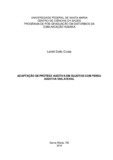| dc.creator | Dalla Costa, Lidiéli | |
| dc.date.accessioned | 2021-05-13T11:42:48Z | |
| dc.date.available | 2021-05-13T11:42:48Z | |
| dc.date.issued | 2018-07-12 | |
| dc.identifier.uri | http://repositorio.ufsm.br/handle/1/20859 | |
| dc.description.abstract | This research aimed to investigate the speech recognition in silence and in noise of subjects presenting unilateral hearing loss, without and with a hearing aid and to analyze the benefit, self-perception of the functional performance, satisfaction and the use of hearing aid in these subjects. Were evaluated 11 adults, presenting unilateral hearing loss, mixed or sensorineural type, from mild to severe degrees. The speech recognition was assessed using the Sentence Lists test in Brazilian Portuguese; the functional performance of the hearing was evaluated through the Speech Spatial and Qualities of Hearing Scale questionnaire; the satisfaction through the Satisfaction with Amplification in Daily Life, both in Brazilian Portuguese; and to evaluate the use of the hearing aid was analyzed the report of the patient. The hearing aid adaptation provided a speech recognition benefit in all evaluated positions, in silence and in noise. The subjects did not mention great limitations in the activities of communication during the use of the hearing aid. They were satisfied with the use of sound amplification. Most of the subjects do not make effective use of hearing aid. The discontinuation of the use can be justified by the difficulty of perceiving the restriction of participation caused by hearing loss, as well as the benefit of the prosthesis, besides the concern with the costs with the batteries and aesthetic aspects. Despite presenting benefit in speech recognition in silence and in noise and satisfaction with hearing aid, most subjects with unilateral hearing loss do not make effective use of the hearing aid. | eng |
| dc.description.sponsorship | Coordenação de Aperfeiçoamento de Pessoal de Nível Superior - CAPES | por |
| dc.language | por | por |
| dc.publisher | Universidade Federal de Santa Maria | por |
| dc.rights | Attribution-NonCommercial-NoDerivatives 4.0 International | * |
| dc.rights.uri | http://creativecommons.org/licenses/by-nc-nd/4.0/ | * |
| dc.subject | Perda auditiva unilateral | por |
| dc.subject | Auxiliares de audição | por |
| dc.subject | Percepção da fala | por |
| dc.subject | Questionários | por |
| dc.subject | Unilateral hearing loss | eng |
| dc.subject | Hearing aids | eng |
| dc.subject | Speech perception | eng |
| dc.subject | Questionnaires | eng |
| dc.title | Adaptação de prótese auditiva em sujeitos com perda auditiva unilateral | por |
| dc.title.alternative | Adaptation of hearing aid in subjects with unilateral hearing los | eng |
| dc.type | Dissertação | por |
| dc.description.resumo | Esta pesquisa teve como objetivo investigar o reconhecimento de fala no silêncio e no ruído de sujeitos com perda auditiva unilateral, sem e com prótese auditiva, e analisar o benefício, autopercepção do desempenho funcional, satisfação e o uso de prótese auditiva nestes sujeitos. Foram avaliados 11 adultos, com perda auditiva unilateral, do tipo mista ou neurossensorial, de graus leve a severo. O reconhecimento de fala foi avaliado por meio do teste Listas de Sentenças em Português Brasileiro; o desempenho funcional da audição foi avaliado por meio do questionário Speech Spatial and Qualities of Hearing Scale; a satisfação por meio do Satisfaction with Amplification in Daily Life, ambos em português brasileiro; e para avaliação do uso da prótese auditiva foi analisado o relato do paciente. A adaptação de prótese auditiva proporcionou benefício no reconhecimento de fala em todas as posições avaliadas, no silêncio e no ruído. Os sujeitos não referiram grandes limitações nas atividades de comunicação com a utilização da prótese auditiva. Demonstraram-se satisfeitos com o uso da amplificação sonora. A maioria dos sujeitos não faz uso efetivo da prótese auditiva. A descontinuidade do uso pode ser justificada pela dificuldade de perceber a restrição de participação causada pela perda auditiva, assim como o benefício da prótese, além da preocupação com os custos com as pilhas e aspectos estéticos. Apesar de apresentarem benefício no reconhecimento de fala, no silêncio e no ruído e satisfação com a amplificação sonora, a maioria dos sujeitos com perda auditiva unilateral não faz uso efetivo da prótese auditiva. | por |
| dc.contributor.advisor1 | Costa, Maristela Julio | |
| dc.contributor.advisor1Lattes | http://lattes.cnpq.br/5004340831068086 | por |
| dc.contributor.advisor-co1 | Santos, Sinéia Neujahr dos | |
| dc.contributor.referee1 | Lessa, Alexandre Hundertmarck | |
| dc.contributor.referee2 | Biaggio, Eliara Pinto Vieira | |
| dc.creator.Lattes | http://lattes.cnpq.br/0393755728869336 | por |
| dc.publisher.country | Brasil | por |
| dc.publisher.department | Fonoaudiologia | por |
| dc.publisher.initials | UFSM | por |
| dc.publisher.program | Programa de Pós-Graduação em Distúrbios da Comunicação Humana | por |
| dc.subject.cnpq | CNPQ::CIENCIAS DA SAUDE::FONOAUDIOLOGIA | por |
| dc.publisher.unidade | Centro de Ciências da Saúde | por |



